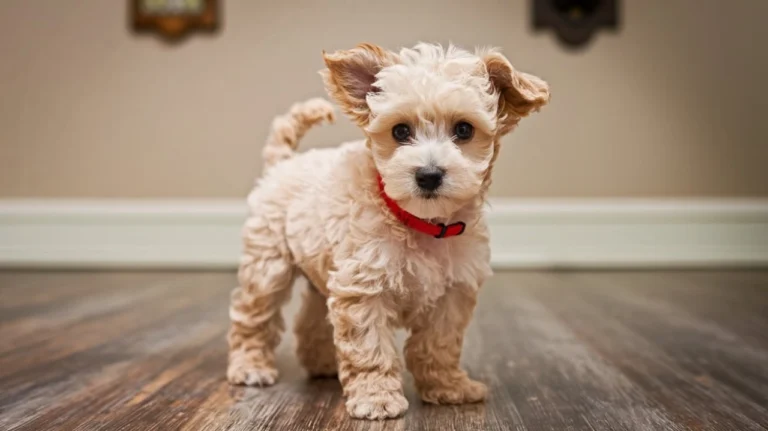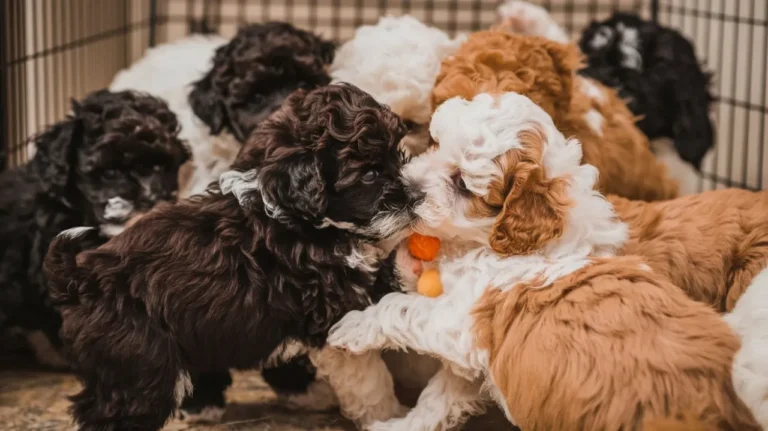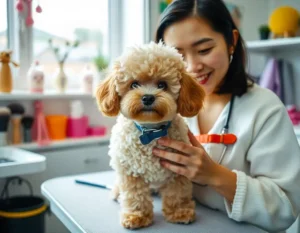If you’re considering bringing a Toy Poodle into your home, one of the first questions you might ask is, How big is a Toy Poodle? This small yet intelligent and entertaining dog breed is perfect for families and individuals living in apartments or smaller spaces. Toy Poodles are known for their playful personality and affectionate nature, but understanding their size and growth patterns is essential for new pet owners. Knowing how big a Toy Poodle will get, how they grow over time, and the factors that influence their size can help you prepare for the responsibilities of owning one of these wonderful companion dogs. In this article, we’ll take a closer look at how big Toy Poodles typically grow, what to expect at different stages of their development, and the factors that affect their size. Whether you’re planning to adopt a Toy Poodle or are just curious, you’ll find useful insights to help you better understand this charming breed.
Toy Poodle Size and Weight

Toy Poodle Size Overview
Toy Poodles are one of the smallest members of the Poodle family, which also includes the larger Standard Poodle and Miniature Poodle. Unlike their bigger counterparts, Toy Poodles are specifically bred to stay compact and light, making them a great choice for families in small living spaces. According to the official breed standard from the American Kennel Club (AKC), Toy Poodles should be no taller than 10 inches at the shoulder and weigh between 6 to 9 pounds. This small size doesn’t mean they’re any less intelligent or energetic than their larger relatives. Toy Poodles are known for their big personalities and lively nature, despite their size.
Factors Affecting Size
- Genetics: Like all dogs, a Toy Poodle’s size is influenced by its genetic makeup. While breed standards provide a general guideline, the individual size of a Toy Poodle can vary depending on the genes passed down from its parents. If the parents are on the larger end of the Toy Poodle size range, there’s a chance their puppies will grow to be slightly bigger, though they should still remain under 10 inches.
- Nutrition: A balanced diet plays a significant role in a Toy Poodle’s growth. Proper nutrition ensures that the dog gets all the essential vitamins and minerals needed for healthy development. Puppies need a higher level of protein and nutrients to support their growth, while adult Toy Poodles require maintenance food that supports their health without contributing to weight gain. Poor nutrition can stunt growth or cause underdevelopment, so it’s essential to feed your Toy Poodle the right food at each life stage.
- Activity Level: While Toy Poodles are small, they are active and need regular exercise to maintain muscle tone and a healthy weight. Regular walks, playtime, and mental stimulation will keep them fit and help ensure they grow within the expected size range. However, since they don’t need as much exercise as larger breeds, their size can remain compact with moderate activity.
Toy Poodle Growth Chart
Toy Poodles grow quickly in the first few months of life, but their growth slows down as they approach adulthood. Here’s a general guideline for tracking their growth:
- 8 weeks: At this age, Toy Poodle puppies typically weigh between 1.8 to 2.4 pounds and are just starting to explore the world around them. Their size is still quite small, but they are rapidly gaining strength and coordination.
- 16 weeks: By 16 weeks, a Toy Poodle will usually weigh around 4 to 5.5 pounds. At this stage, they’re still growing, and you can monitor their health and development by checking their weight regularly. It’s essential to ensure they’re not gaining weight too quickly or too slowly.
- 6 months: At six months, your Toy Poodle is about 75% of the way to its adult size. Expect them to weigh between 4.5 and 6.75 pounds. This is a critical stage in their development, as they will begin to transition from puppy behavior to more adult-like traits.
- 9 months: By nine months, your Toy Poodle is 90% of its adult size, with an estimated weight of 5.4 to 8.1 pounds. While they may still have a bit of growing to do, most of their physical development will be complete.
- 12 months: At one year, your Toy Poodle should be close to fully grown, weighing around 6 to 9 pounds. Although they may still exhibit some playful puppy behavior, they are entering adulthood at this stage.
- Fully Grown (18 months): By 18 months, most Toy Poodles will have reached their full size. They should weigh between 6 to 9 pounds and be no more than 10 inches tall at the shoulder. Their growth will have stabilized, and they will now be ready for adult maintenance care.
Understanding these key stages can help you ensure your Toy Poodle is growing at a healthy and normal rate. If you have concerns about your dog’s growth or weight, it’s always best to consult with a veterinarian to make sure they are on track for a happy, healthy life.
Toy Poodle Lifespan

Life Expectancy
Toy Poodles are known for their long and healthy lives, with an average lifespan of 12 to 15 years. This makes them one of the longer-living small dog breeds. With proper care, some Toy Poodles can even live well into their late teens. Their longevity is one of the reasons why they’re such a beloved companion for families, as they are able to stay by their owners’ sides for many years. Of course, their lifespan can be influenced by several factors, including genetics, diet, and overall health care.
Factors Influencing Longevity
- Genetics: As with any breed, genetics plays a significant role in how long a Toy Poodle will live. Some Toy Poodles may inherit genetic conditions like heart disease, progressive retinal atrophy (PRA), or other hereditary health issues that can impact their lifespan. While not all Toy Poodles will experience these conditions, responsible breeding practices can help reduce the risk of passing down genetic problems. It’s important to ask about the health history of your dog’s parents when considering adoption or purchase.
- Quality Nutrition: Providing your Toy Poodle with a well-balanced diet is crucial for maintaining their overall health and longevity. A high-quality dog food that meets the nutritional needs of a small breed helps prevent obesity, supports healthy organ function, and promotes a strong immune system. It’s important to feed your dog the right food at different life stages (puppy, adult, senior) and consult your veterinarian about any special dietary needs your dog may have. Proper weight management, along with the right amount of vitamins and nutrients, can significantly extend your Toy Poodle’s life.
- Regular Veterinary Care: Regular check-ups with your veterinarian are essential for detecting any health issues early. Veterinary visits allow for timely vaccinations, parasite prevention, and screenings for common health conditions such as heart disease or dental disease. Catching health issues early on can help manage them more effectively, leading to a better quality of life and potentially a longer lifespan for your Toy Poodle. Preventative care, including dental cleanings, vaccinations, and parasite treatments, should be part of your routine to keep your dog healthy throughout its life.
By focusing on genetics, quality nutrition, and regular veterinary care, you can help your Toy Poodle enjoy a long, healthy, and happy life.
Behavior and Training Tips for Toy Poodles
Toy Poodle Personality
Toy Poodles are known for their playful and eager-to-please nature, which makes them an absolute joy to have around. They are highly intelligent dogs, and their quick learning abilities make them excellent candidates for obedience training. Whether you’re teaching them simple commands or more complex tricks, Toy Poodles are often up for the challenge. Their friendly and social demeanor makes them great companions for families with children, as they tend to be gentle and affectionate. They also form strong bonds with their owners, making them ideal pets for individuals looking for a loyal companion.
While their personality makes them great pets, it also means they require consistent interaction and mental stimulation to stay happy. Without proper engagement, they may become bored or develop undesirable behaviors. Thankfully, with the right training and attention, Toy Poodles are easy to manage and thrive in a loving, structured environment.
Training Tips
Toy Poodles respond best to positive reinforcement methods. Using treats, praise, and affection as rewards encourages them to repeat desirable behaviors. When training your Toy Poodle, consistency is key. Be patient, and always reinforce good behavior with something they enjoy, whether that’s a tasty treat or a favorite toy. Avoid harsh punishments, as they are unnecessary and can negatively impact your dog’s trust and confidence.
One common issue many Toy Poodle owners face is separation anxiety. Due to their strong attachment to their owners, they can become anxious when left alone for extended periods. To avoid this, it’s important to gradually get your Toy Poodle used to being on their own. Start with short separations and gradually increase the time apart, making sure to provide them with activities like chew toys or puzzle games to keep them occupied. Consistent routines and predictable schedules also help them feel secure and reduce anxiety.
To prevent destructive behavior, it’s important to establish boundaries and encourage positive habits early on. Chewing, barking, or digging may occur if your Toy Poodle is bored or anxious. Redirect these behaviors by offering appropriate alternatives, such as chew toys or interactive playtime. The key is to be proactive in giving them the right outlet for their energy and mental stimulation.
Mental Stimulation
Since Toy Poodles are highly intelligent, they require plenty of mental stimulation to stay content. Without it, they may become restless or develop undesirable behaviors. Providing enrichment puzzles, interactive toys, or engaging games can be a great way to keep your dog’s mind sharp. Activities that challenge their problem-solving skills, like nose work or scent tracking, are excellent choices for mentally stimulating your Toy Poodle. These exercises tap into their natural curiosity and help satisfy their instinctual need for stimulation.
Agility training is another fun way to engage your Toy Poodle’s mind and body. They enjoy tasks that allow them to show off their skills, and agility courses give them a physical and mental challenge that can help burn off excess energy. Whether it’s through nose work, tracking, or agility training, keeping your Toy Poodle mentally active ensures they remain well-rounded, happy, and content.
By understanding your Toy Poodle’s behavior and training needs, you can create a positive environment where they feel secure and engaged. With patience, consistency, and plenty of love, your Toy Poodle will flourish and become a well-mannered companion.
Toy Poodle Full Grown
When Does a Toy Poodle Stop Growing?
Most Toy Poodles will reach their full adult size by around 18 months, though some may stop growing a little earlier or later. By the time they’re one year old, they are typically close to their full height and weight, but the final stages of growth may involve gaining a bit more muscle or body mass. It’s important to remember that growth is influenced by several factors, including genetics, nutrition, and overall health. While Toy Poodles are small dogs, each one is unique, and their growth may vary slightly.
Growth Timeline:
- 8 Weeks to 6 Months: At this early stage, your Toy Poodle will rapidly grow, gaining weight and becoming more agile. By six months, they are usually about 75% of their full-grown size.
- 9 Months to 12 Months: Between 9 and 12 months, your Toy Poodle continues to develop, reaching about 90% of their adult size. This is when you’ll notice their growth slowing down, but they may still fill out a bit more.
- 12 Months to 18 Months: During this period, they should be almost fully grown. Around 18 months, most Toy Poodles will have reached their final size.
While the majority of Toy Poodles will stop growing by 18 months, some may take a little longer, particularly if there are slight variations in genetics or nutrition.
Size Variations in Individual Dogs
Genetics play a big role in determining how large or small a Toy Poodle might get. Some Toy Poodles may be closer to the minimum size range, while others may fall closer to the maximum. For example, some dogs may weigh closer to 6 pounds, while others could weigh up to 9 pounds. While the general breed standard sets the limit at 10 inches tall and 6-9 pounds in weight, individual size can vary slightly. Environment, such as nutrition, exercise, and overall health, can also impact how large your Toy Poodle grows. However, no matter what, they will remain a small dog, perfect for apartment living and cozy spaces.
What to Expect from a Fully Grown Toy Poodle
- Weight: A fully grown Toy Poodle typically weighs between 6 and 9 pounds. Some may be on the lighter side, while others may reach the upper end of this range.
- Height: They stand up to 10 inches tall at the shoulder. Any dog taller than this is typically considered a Miniature Poodle, which is a slightly larger variation of the breed.
- Physical Characteristics: Once fully grown, Toy Poodles retain their signature curly coat, which requires regular grooming to keep it tangle-free. Their coat is hypoallergenic, meaning it produces less dander than most other breeds, making them a good choice for people with allergies. Additionally, they shed very little, which makes them a great option for those looking for a low-maintenance dog in terms of shedding.
A fully grown Toy Poodle is a compact, lively, and affectionate dog with a unique coat and friendly disposition. Despite their small size, they carry a big personality and will continue to require the same care and attention throughout their adult life. With the right diet, exercise, and grooming, your Toy Poodle will remain happy and healthy well into their later years.
Ideal Diet for Maintaining a Healthy Weight

Nutritional Needs
Feeding your Toy Poodle the right diet is essential to maintaining a healthy weight and ensuring proper growth. As a small breed, Toy Poodles have unique nutritional requirements. For puppies, it’s important to start with a small-breed puppy formula, which is specially designed to support their rapid growth and development during the first year of life. This formula provides the right balance of protein, fat, and calories to fuel their energy needs while promoting healthy bones and muscles.
As your Toy Poodle matures, it’s time to transition to adult maintenance food. Adult food contains fewer calories to prevent overfeeding, which could lead to obesity. A well-balanced adult diet will help maintain their health and keep them at a steady weight.
Your Toy Poodle’s diet should also include essential nutrients like Omega-3 fatty acids (DHA/EPA), which support joint health and contribute to a shiny, healthy coat. Vitamins and minerals are equally important for overall well-being, helping with immunity, digestion, and energy levels.
Calorie Needs
Knowing how many calories your Toy Poodle needs each day is key to maintaining a healthy weight. The exact number will vary based on factors like their age, activity level, and weight. You can use a dog calorie calculator to determine their daily calorie intake. These tools help estimate how much food your dog needs based on their size and lifestyle. For example, a more active Toy Poodle will require more calories than one who is less active or older.
It’s also important to monitor your Toy Poodle’s food intake and adjust portion sizes as needed. Obesity is a common issue in small dog breeds, and it can lead to health problems like joint issues or diabetes. Regularly measuring their food and sticking to a consistent feeding schedule will help you avoid overfeeding. Be sure to track their weight to ensure they stay within the healthy range of 6 to 9 pounds. If you notice any weight gain, you can cut back on their portions slightly or increase their activity level.
Common Diet Pitfalls
While it may be tempting to give your Toy Poodle treats or scraps from the table, poor nutrition can have serious consequences. Feeding your dog the wrong type of food or overfeeding can lead to stunted growth, obesity, or nutrient deficiencies, all of which can affect their long-term health. For example, feeding too many high-calorie treats can quickly add up and contribute to unnecessary weight gain.
To avoid these pitfalls, choose AAFCO-approved food, which ensures that the food meets specific nutritional standards for dogs. Always stick to regular meal times, as consistency helps regulate their metabolism and prevents overeating. Instead of giving random scraps, provide healthy, dog-friendly treats in moderation and only when appropriate.
By giving your Toy Poodle a balanced diet tailored to their needs, you’ll help them maintain a healthy weight, support their development, and provide them with a long, active, and happy life. A well-fed Toy Poodle is a healthy and energetic companion as well.
How to Measure Your Toy Poodle
Measuring for Size
Measuring your Toy Poodle helps you track their growth and ensure they’re developing as expected. To get an accurate picture of their size, you’ll need a few simple tools. A tape measure, kitchen scale, and possibly a soft surface for them to stand on will be all you need.
- Tape Measure: A flexible tape measure is ideal for measuring your Toy Poodle’s height and body length. This allows you to get precise measurements without causing discomfort to your puppy.
- Kitchen Scale: If your puppy is small, it can be tricky to weigh them using a bathroom scale. A kitchen scale, paired with a bowl, works well to get a more accurate weight. You can place your puppy in the bowl and subtract the bowl’s weight after weighing to get an accurate reading.
To measure your Toy Poodle’s size, focus on these key points:
- Shoulder Height: Stand your puppy on all fours and measure from the floor to the top of their shoulders. This gives you their height at the withers, the standard way of measuring dog height.
- Body Length: Measure from the base of their neck (where the neck meets the shoulders) to the base of the tail. This helps track their growth in length.
- Overall Weight: Weigh your Toy Poodle regularly to monitor their growth and ensure they are staying within the healthy weight range of 6 to 9 pounds.
Tracking Growth
Tracking your Toy Poodle’s growth over time is essential for understanding their development. Keep a growth chart or log where you can record their measurements at different stages. This allows you to see how they’re progressing and ensure they’re on track to reach their full adult size.
- Growth Milestones: You can record their height, weight, and other key measurements at regular intervals, such as every few weeks or months. This helps you compare their development to the typical growth pattern for Toy Poodles.
- Consistency: Be consistent with how you measure them. Always measure at the same time of day and in the same way. For example, weigh them before their morning meal to avoid fluctuations due to food intake.
By keeping track of your Toy Poodle’s measurements, you’ll have a clear picture of how they’re growing and be able to address any concerns with your vet if something doesn’t seem quite right. Regular updates will also give you peace of mind, knowing your puppy is developing within the expected size range for their breed.
Facts About Toy Poodles
Origin and History
The Toy Poodle’s origins trace back to France and Germany, where it was originally bred for waterfowl hunting. Despite its small size, the Toy Poodle comes from a lineage of hardworking Poodles known for their water-retrieving abilities. Over time, Toy Poodles transitioned from working dogs to beloved companion animals. Their charming personality, intelligence, and playful nature have made them a popular choice for families and individuals around the world.
As they became more domesticated, Toy Poodles gained popularity not just as hunters, but as fashionable pets. Their hypoallergenic coat, coupled with their social nature, made them ideal for people living in various environments, including urban settings where space is limited.
Popularity and Adaptability
Toy Poodles are especially well-suited for apartment living. Their small size and low exercise needs make them perfect for those living in smaller spaces. Despite their size, Toy Poodles are full of energy and enjoy activities that stimulate their minds, so they’re happy with short daily walks and interactive play.
What makes Toy Poodles such excellent pets? For starters, they are incredibly loyal and intelligent. They are easy to train and love to please, which makes them ideal companions for families. Their friendly, outgoing nature means they typically get along well with children and other pets. Whether you’re looking for a companion to curl up with on the couch or a dog to enjoy daily activities, the Toy Poodle fits the bill.
Coat and Grooming
One of the most distinct features of the Toy Poodle is its curly, dense coat. Unlike most dogs, Toy Poodles have continuous hair growth rather than fur shedding, which is why they’re considered hypoallergenic. This makes them an ideal choice for people with allergies. However, this coat requires regular care. Toy Poodles need to be groomed every 4-6 weeks to maintain their coat’s health and prevent mats from forming.
Along with regular grooming, their coat also benefits from being kept clean with proper skin care. Many Toy Poodle owners choose to keep their dog’s coat clipped into a manageable length, whether that’s the popular puppy cut or a show clip, like the Continental clip, to keep them looking neat and tidy.
In short, Toy Poodles are not only small and playful, but they also have a unique, low-shedding coat that’s easy on allergy sufferers. With regular grooming, your Toy Poodle can stay looking their best and feeling comfortable.
Caring for a Toy Poodle

Exercise Needs
Although Toy Poodles are small, they still require moderate exercise to stay healthy and happy. Daily walks are important for their physical well-being, and a bit of playtime in a secure area will keep them active. Mental stimulation is just as crucial for Toy Poodles, as they are highly intelligent dogs. Interactive toys, puzzle games, or short training sessions can keep their minds engaged and prevent boredom. Without enough mental or physical exercise, Toy Poodles can become restless and may engage in undesirable behaviors, so it’s essential to incorporate both types of activities into their daily routine.
Grooming and Coat Care
A Toy Poodle’s curly coat is one of its defining features, but it also requires regular maintenance to keep it healthy and free of mats. You should give your Toy Poodle a bath and detangle its coat regularly to maintain its softness and shine. Depending on your dog’s lifestyle and activity level, you may need to bathe them once every few weeks or more frequently if they get dirty.
In addition to coat care, ear health is important for Toy Poodles. Their floppy ears can trap moisture and debris, making them more prone to infections. Clean your Toy Poodle’s ears regularly, trimming any hair inside the ear canal if needed. To prevent tear staining, which is common in Toy Poodles, use a saline solution to gently clean the area around their eyes. Regularly brushing their teeth is also essential to prevent dental problems, as small dogs can be prone to gum disease and plaque buildup.
Health Concerns
While Toy Poodles are generally healthy, they can be prone to a few health issues. Some common conditions include patellar luxation (a condition where the kneecap dislocates), Legg-Calvé-Perthes disease (a hip joint issue), and Von Willebrand’s Disease (VWD), a genetic blood disorder. These conditions can often be managed with proper care, so it’s important to monitor your Toy Poodle for any signs of discomfort or abnormal behavior.
Preventive care is vital, including feeding them a balanced diet, regular exercise, and keeping up with grooming. Pet insurance can also be a smart choice to help cover any potential veterinary costs related to these health issues.
Veterinary Care
Regular veterinary exams are a cornerstone of Toy Poodle health. Routine check-ups can help catch common issues like heart disease, tracheal collapse, or other breed-specific conditions early. Your vet will also advise on vaccinations, parasite prevention, and any other steps to ensure your Toy Poodle’s well-being.
Overall, caring for a Toy Poodle involves a balanced approach to exercise, grooming, and health maintenance. By staying on top of their needs and regular vet visits, you can help ensure your Toy Poodle leads a long, healthy, and happy life.
Toy Poodle Health Issues
Common Health Problems
Toy Poodles, like all breeds, are susceptible to certain health problems. Understanding these conditions can help you provide the best care for your dog.
Patellar Luxation
This is a common issue in small dog breeds, including Toy Poodles. It occurs when the kneecap (patella) slips out of place, causing pain and difficulty walking. In mild cases, the patella may move back into place on its own, but in more severe cases, surgery may be required. To help prevent patellar luxation, avoid excessive jumping or rough play, and ensure your dog maintains a healthy weight to reduce stress on the joints.
Progressive Retinal Atrophy (PRA)
PRA is a genetic condition that causes gradual vision loss due to the degeneration of the retina. Early signs may include difficulty seeing in low light or disorientation. Unfortunately, there is no cure for PRA, but early detection can help you adjust your Toy Poodle’s environment to ensure they are still comfortable. Regular veterinary eye exams can help detect PRA before symptoms become severe.
Ear Infections
Toy Poodles are prone to ear infections because of their floppy ears, which can trap moisture and debris. It’s important to clean your dog’s ears regularly and keep them dry, especially after baths or swimming. If you notice signs of infection such as redness, odor, or excessive scratching, consult your vet promptly to prevent more serious issues.
Dental Disease
Small dogs like Toy Poodles are more susceptible to dental problems such as tartar buildup, gum disease, and tooth loss. Brushing your Toy Poodle’s teeth regularly and providing dental chews or toys can help maintain their oral health. Regular vet check-ups will also help catch dental issues early.
Tracheal Collapse
This is a condition where the trachea (windpipe) weakens, leading to difficulty breathing and coughing, especially during excitement or exercise. While tracheal collapse cannot always be prevented, managing your dog’s weight, avoiding harsh collars (use a harness instead), and ensuring they don’t overexert themselves can help minimize the impact.
Preventive Measures
Preventing health issues and catching them early is essential for maintaining your Toy Poodle’s well-being. Regular veterinary check-ups and vaccinations are crucial for detecting potential health problems, such as heart disease, early on. A proactive approach to healthcare will allow you to address issues before they become serious.
Additionally, ensuring that your Toy Poodle is up to date on flea, tick, and heartworm prevention will help avoid other health concerns that could impact their quality of life.
Healthy Weight and Exercise
Maintaining a healthy weight is one of the most effective ways to prevent health problems in Toy Poodles. Obesity can exacerbate joint issues like patellar luxation, increase the risk of heart disease, and generally affect your dog’s overall health. To keep your Toy Poodle at an ideal weight, follow appropriate feeding guidelines and offer regular exercise.
Daily walks, interactive play sessions, and mental stimulation (like puzzle toys) are essential for keeping your Toy Poodle both physically and mentally fit. If your dog is overweight, work with your vet to develop a safe weight-loss plan that includes portion control and increased activity.
Weight management is especially important for small dogs like Toy Poodles, as even a small amount of excess weight can lead to big health problems. Ensuring that your dog maintains a healthy weight, combined with regular exercise, will go a long way in preventing obesity-related diseases and improving your Toy Poodle’s quality of life.
Toy Poodles are generally healthy dogs, they are prone to certain health issues. Being proactive with regular check-ups, a balanced diet, proper exercise, and preventive care can help you manage and prevent many of these common problems.
Conclusion
In conclusion, Toy Poodles are a delightful and versatile breed, known for their small size, playful personality, and intelligence. Understanding their growth patterns, health needs, and training requirements is essential for ensuring they lead a long, healthy, and happy life. From maintaining a balanced diet and regular grooming to providing mental stimulation and proper training, every aspect of their care plays a crucial role. At Toy and Poodle Puppies, we encourage all Toy Poodle owners to stay proactive with their pet’s health, consult with a veterinarian regularly, and create a nurturing environment to help your Toy Poodle thrive. With the right care, your Toy Poodle will undoubtedly be a joyful companion for years to come.
FAQs
What Is The Personality Of A Toy Poodle?
Toy Poodles are friendly, playful, and affectionate. They are very intelligent and eager to please, making them great companions for families and individuals alike. They enjoy being around people and tend to bond strongly with their owners.
How Do I Handle Separation Anxiety In My Toy Poodle?
To prevent separation anxiety, start by creating a consistent routine and gradually increasing the time you leave your Toy Poodle alone. Use positive reinforcement to reward calm behavior and provide toys or puzzles to keep them busy. If anxiety persists, consider seeking advice from a professional trainer.
How Much Exercise Does A Toy Poodle Need?
Toy Poodles require moderate exercise, such as daily walks and playtime. While they don’t need intense physical activity, regular mental stimulation and light physical exercise are important to keep them happy and healthy.
How Often Do I Need To Groom My Toy Poodle?
Toy Poodles need regular grooming due to their curly coats. Expect to brush them several times a week to prevent matting and schedule a professional grooming every 4-6 weeks to maintain their coat and trim nails. Regular ear cleaning and dental care are also important.
What Are The Common Health Concerns For Toy Poodles?
Toy Poodles can be prone to conditions like patellar luxation, progressive retinal atrophy (PRA), and dental disease. Regular veterinary check-ups, a balanced diet, and preventive care can help manage or reduce the risk of these issues.
How Is The Toy Poodle Different From Miniature And Standard Poodles?
The main differences between these Poodle types are size and temperament. Toy Poodles are the smallest, standing up to 10 inches tall and weighing 6-9 pounds, making them ideal for apartment living. Miniature and Standard Poodles are larger and may require more space and exercise. All Poodles share similar intelligence and grooming needs but vary in size and activity levels.








